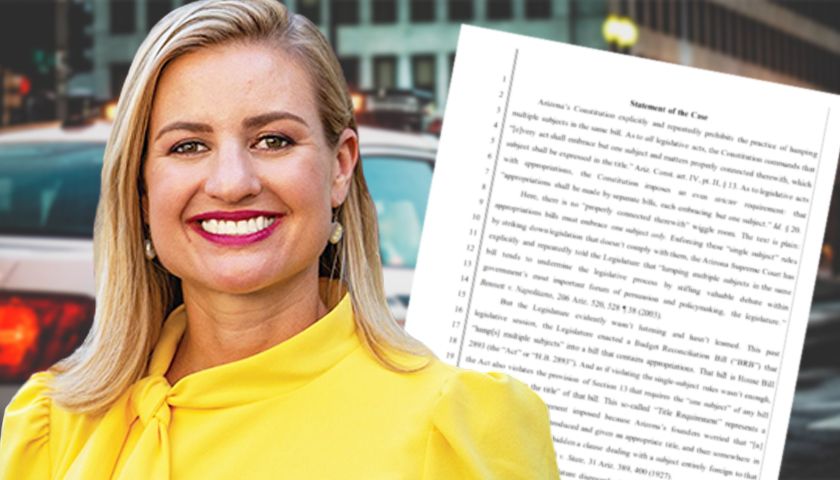The City of Phoenix filed a lawsuit against the State of Arizona on Tuesday, contending that new legislation regulating police review boards and expanding the attorney general’s powers of investigation violates the state constitution.
HB 2893 requires that the members of police misconduct boards be partially composed of police officers, but the city set up its own review board a month before the legislation was passed, which says police officers or former police officers shall not sit on its police review board.
Similarly, the city objects to the qualifications laid out in the law for civilian review boards; the city merely wants non-city employees serving on it, but the legislation requires that board members have some training. And finally, the city objects to a provision which states that when requested by a legislator, the attorney general may investigate laws or rules passed by lower levels of government that appear to violate state law and withhold state funding if a violation is found.
Phoenix City Councilman Sal DiCiccio denounced the lawsuit. He told The Arizona Sun Times, “Phoenix politicians are desperate to load their newly created police review board with anti-cop activists and city-hall cronies while forcing children to mask up for the rest of their lives. It’s outrageous, and so is suing the state to stop a budget practice that has long legal standing. It’s a total waste of taxpayer money.”
The city claims the new laws violate Article IV, Pt. II, Section 13’s “single subject rule” of the state constitution, which prohibits legislation from containing more than one subject. The lawsuit also contends the act violates the “title requirement” of Section 13, since the title is “criminal justice; budget reconciliation,” which the city contends goes beyond that as a “hodgepodge of topics.”
Section 13 states: “Every act shall embrace but one subject and matters properly connected therewith, which subject shall be expressed in the title; but if any subject shall be embraced in an act which shall not be expressed in the title, such act shall be void only as to so much thereof as shall not be embraced in the title.”
However, the city admits in its brief that Arizona caselaw states in part that Section 13 “should be interpreted liberally so as to uphold the constitutionality of an act if there is any legal basis for its validity.”
The city also alleges that the bill violates Article IV, Pt. II, Section 20 by encompassing more than just appropriations. Section 20 provides, “The general appropriation bill shall embrace nothing but appropriations for the different departments of the state, for state institutions, for public schools, and for interest on the public debt. All other appropriations shall be made by separate bills, each embracing but one subject.”
According to court records, since Phoenix set up its new Office of Accountability and Transparency, nearly 90 people have applied to become director, but none of them would qualify under the state law since they have no law enforcement background.
There is opposition to police officers serving on oversight boards around the country due to a perception they would show favoritism to their fellow law enforcement officers under investigation. However, studies in Los Angeles found that the opposite happened, all-civilian panels recommended more lenient treatment of officers than boards made up of police officers.
A.R.S. 38-1117 (which will be added to title 38) will require two-thirds of most bodies that review police misconduct to be law enforcement officers from the same department where the misconduct took place. All members of civilian review boards are required to have at least 80 hours of community college or AZPOST-certified police training. The education must include 20 hours of simulated event training. Civilians who participate in Los Angeles review boards have heftier background requirements than under the Arizona law.
The city’s lawsuit seeks to stop the laws from going into effect on their scheduled date of September 29. The Department of Justice launched an investigation under the Biden administration on August 5 into the Phoenix Police Department over its policing. However, Moses Sanchez, who is running for Phoenix City Council to replace DiCiccio, who is term-limited, told The Sun Times there were a few bad apples in the department who have been removed in recent years.
– – –
Rachel Alexander is a reporter at the Arizona Sun Times and The Star News Network. Follow Rachel on Twitter. Email tips to [email protected].
Photos “Kate Gallego” by Kate Gallego for Phoenix and “Police Car” by Jobs for Felons Hub (CC BY 2.0).






Democrat in phoenix trying to stack the deck against police officers. We need to start stacking the deck agains democrat politicians, they are useless. The majority of them have no clue what they are doing. Sadly some Republicans are the same way.